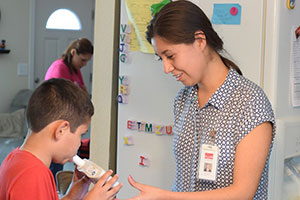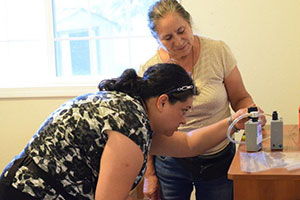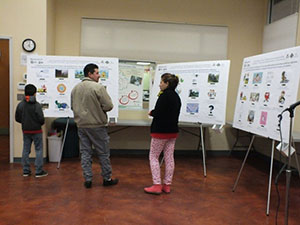Overview:
In 2014, staff from the University of Washington (UW) and community partners began testing a home intervention trial called “Home Air in Agriculture - Pediatric Intervention” (HAPI). The trial, based in Washington’s Yakima Valley, hopes to reduce childhood asthma by combining asthma education and health assessments with air filters to reduce allergens in the home. According to project leader Catherine Karr, M.D., Ph.D., of UW, HAPI is leveraging an existing community partnership in the region, and relies heavily on community leadership.
Citizen involvement for HAPI includes:
- Identifying research questions of interest to the community
- Maintaining day-to day conduct of the study
- Conducting in-home asthma health assessments and educating families about asthma and disease management
- Training to assist with environmental assessments
- Participating in a community advisory board to shape intervention design and research translation approaches
- Developing public speaking skills and becoming leaders in the field by giving oral or poster presentations at local and regional meetings
Background:

A trained staff member from the Yakima Valley Farmworkers Clinic coaches a patient through an asthma test during a home visit.
(Photo courtesy of Catherine Karr)
The Yakima Valley is a region with intense agricultural production and the highest concentration of migrant and seasonal farmworkers in Washington State. In 2002, a community-based participatory research project was established called El Proyecto Bienestar (EPB), which involves a partnership between UW researchers, Yakima Valley residents, a Yakima Valley community advisory board (CAB), the Yakima Valley Farmworkers Clinic, the Northwest Communities Education Center/Radio KDNA, and Heritage University. This project is ongoing, and aims to address occupational and environmental issues of importance to Hispanic agricultural workers and their families.
Collaboration with EPB partners helped Karr and her team identify childhood asthma as a priority community health concern, which led to the launch of the new HAPI study in 2014. HAPI seeks to enroll 75 Latino children living within 400 meters of agricultural operations who suffer from poorly controlled asthma for an in-home educational and air filtration intervention.
Citizen Involvement:
Community partners are heavily involved in all aspects of HAPI – this includes conducting the study on a day-to-day basis, as well as guiding the study direction, design, and translation strategies.

Two staff members from the Northwest Community Education Center/Radio KDNA prepare air pollution monitoring equipment.
(Photo courtesy of Catherine Karr)
For example, staff at the Yakima Valley Farmworkers Clinic perform all the in-home asthma health assessments, including spirometry and exhaled nitric oxide measurements. They also provide the in-home asthma education program to help families better understand the disease and how to manage it. Staff at the Northwest Communities Education Center/Radio KDNA are trained to help with environmental assessments, which includes learning how to properly set up or take down air pollution monitors.
The CAB guides the study design to ensure it is not overly burdensome for participants, offers insight to address any problems that arise, and provides input on research translation strategies that will be most effective for the community. In addition, community partners join the UW team at NIEHS grantee meetings, as well as at local and regional conferences. These meetings provide the community partners with opportunities to develop skills in public speaking by giving oral or poster presentations, and to grow as leaders and representatives of their community.
The HAPI and EPB projects also provide opportunities for community partners, members, local health authorities, and local media to participate in special events. For example, a special showcase event was held recently in collaboration with the National Institute for Occupational Safety and Health-sponsored Pacific Northwest Center for Agricultural Safety and Health. Attendees learned about HAPI and other EPB projects from informational booths and engaged in hands-on activities, such as interacting with air monitoring equipment and air cleaners used in the study. This event also allowed community members to vote on future projects.
Outcomes:

Participants at the showcase event vote on research topics of interest for future projects.
(Photo courtesy of Catherine Karr)
Individual learning outcomes. The enriched in-home asthma education program is providing families with a better understanding of the disease overall, as well as the types of medications that are used and how environmental factors may trigger symptoms or contribute to disease severity. Combined with the air filters to reduce particulate matter, ammonia, and indoor allergens, Karr and her team anticipate that the intervention will also empower families to be able to better control asthma and improve the quality of life for their children.
Community-level outcomes. The HAPI initiative is increasing community partners’ capacity to conduct successful and sustainable research projects, both collaboratively with UW and independently. This is done by training and fostering job skills related to conducting community-based research (e.g., conducting health assessments, collecting biological or environmental samples, educating children and families, and working with air quality monitoring equipment). The initiative is also empowering the community to address the health impacts of industrial agriculture and inform local health policies.
Programmatic outcomes. The team’s work has shown that air quality in rural regions with intense agricultural production can be as poor, or worse, than in urban environments. Unlike cities where the air pollution is predominantly attributed to traffic or industrial sources, rural air pollution comes from crop production, industrial-scale animal operations, and wood burning.
Researchers and community partners have also identified rural air pollutants, including particulate matter and ammonia, a marker of livestock-related air pollution, as local risk factors for asthma morbidity.
Challenges:
Bringing the distance. The Yakima Valley community is located across a mountain range from the UW campus. Although weather, particularly in the winter, can interfere, the team is dedicated to driving long distances to maintain strong relationships through face-to-face interaction.
Securing the time and investment to translate research into action. Studies like HAPI are incredibly complex, requiring substantial investments in training and relationship-building to be successful. The project team ensures that community partners develop the experience and expertise needed to perform their work with confidence. Getting buy-in from some community members can be difficult, making it essential to demonstrate that community members are invested in achieving a common goal.
Contact

Catherine Karr
Related information:
- Visit the NIEHS Research to Action Webpage for a description of the HAPI trial.
- Loftus, C, Yost MG, Sampson P, Arias G, Torres E, Vasquez VB, Bhatti P, Karr CJ. 2015. Regional PM2.5 and asthma morbidity in an agricultural community: A panel study. Env Research. Environ Res 136:505-12.
- Loftus C, Yost M, Sampson P, Torres E, Arias G, Breckwich Vasquez V, Hartin K, Armstrong J, Tchong-French M, Vedal S, Bhatti P, Karr C. 2015. Ambient Ammonia Exposures in an Agricultural Community and Pediatric Asthma Morbidity. Epidemiology 26(6):794-801.


